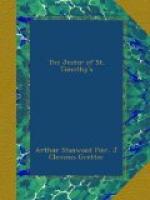“No, I don’t either. Well, it doesn’t matter much; reproof slides off Westby like water off a duck’s back.”
They talked of other things then until Lawrence had to join his team and enter the athletic house with them to dress.
Out on the field Irving mingled with the crowd, walked to and fro nervously, stopped to say only a word now to a boy, now to a master, and then passed on. It was foolish for him to be so excited, so tremulous, he told himself. Lawrence had parted from him with the same calmness with which he might have gone to prepare for bed. It was all the more foolish to be so excited, because the accessories to promote a preliminary excitement were lacking,—rivalry, partisanship; the visiting team had no supporters.
The School had turned out to see the game, but there was no cheering, no thrill of expectation; the boys stood about and waited quietly, as they would before ordinary practice. It would be different in another week, when the St. John’s team were sharing the athletic house with St. Timothy’s, and the adherents of the two schools were ranged opposite each other, waving flags and hurling back and forth challenging cheers—cheers meant to inspirit the players while they dressed. But now Irving was aware that he in all the crowd was the only one whose nerves and muscles were quivering, whose voice might not be quite natural or quite under his control, whose heart was beating hard.
If Lawrence should not play well this time—the first time he had ever seen him play! Or if anything should happen to him! Irving tramped back and forth, digging cold hands into his pockets.
The Harvard team was the first to leave the athletic house; they broke through the line of spectators near where Irving stood and trotted out on the field. As they passed, he caught his brother’s eye and waved to him. In the preliminary practice Irving watched him eagerly; with his light curly hair he was conspicuous, and as he was on the end of the line his movements were easy to follow. It seemed to Irving that he was the quickest and the readiest and the handsomest of them all.
Out came St. Timothy’s, and then there was a cheer. The two teams went rollicking and tumbling up and down the field for a few moments; then Collingwood and the Harvard captain met in the centre, Mr. Barclay tossed a coin, and the players went to their positions. Mr. Barclay blew a whistle; the game began.
From that time on Irving trotted up and down the side lines, his heart twittering with pride and anxiety. After every scrimmage, after every tackle, he looked apprehensively for a curly light head; he was always glad when he saw it bob up safely out of a pile. Through all the press and conflict, he watched for it, followed it—just as, he thought in one whimsical moment, the French troopers of Macaulay’s poem watched for the white plume of Navarre.
If he had known even less about the game than he did, he must still have seen that for Harvard his brother and Ballard, the fullback, were playing especially well. Ballard, with his hard plunges through the centre and his long punts, was the chief factor in Harvard’s offensive game; Lawrence was their ablest player on the defense.




